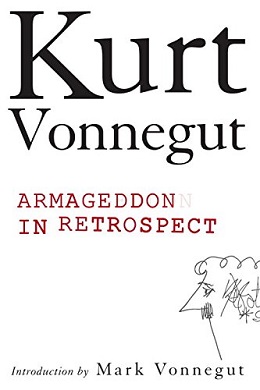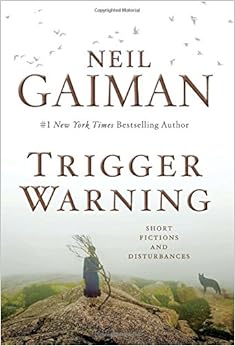I find myself in one of the most creatively busy periods of my life at the moment (scoring a film, finishing an album, writing, blogging, repairing the house, and also, the kids are out of school), so the approach I've taken to my summer reading is one that will hopefully allow me to bite things off in pieces, and keep from getting bogged down. Nabokov's Pale Fire was on my reading list last summer, for instance, but I'm still working on that one because it is both densely written and a physically demanding book to read. You have to have two bookmarks, for instance. So biting that one off was a mistake I'm trying not to replicate.
To that end, I'm eyeing short story collections and things that are easily sub-divided. Off we go...
1. Armageddon in Retrospect by Kurt Vonnegut
I'm not entirely sure why I haven't picked this one up sooner. I am, after all, the guy who ranked all of Vonnegut's novels in a way that met with far less derision than when I tried to rank the Harry Potter movies or those times I tried to let readers rank sci-fi TV shows and movies. These stories deal chiefly with war, and while I rarely love Vonnegut's short stories in the way I love his novels and autobiographical writings, they are always artfully crafted and engaging. I do feel a little strange about this collection being published posthumously and kicking off a series of posthumous story collections, since Vonnegut expressed during his life that A Man Without a Country was intended to be his final work, but his son Mark was involved in this collection and wrote a lengthy introduction, and I guess that's just what people do when famous artists die. Ask Johnny Cash.
2. Trigger Warning by Neil Gaiman
Neil Gaiman's just one of those cats who make our time here a little better. His tongue-in-cheek short story Shoggoth's Old Peculiar, in which a lone American tourist on a walking tour of the English coastline stumbles into a town populated by acolytes of Cthulhu, is one of my favorites, and I have been very proud of my children's fondness for Coraline and Fortunately, the Milk. I picked up Trigger Warning when it was released earlier this year, and can't wait to dive in. This is a collection of stories written over, broadly, the last decade or so, so concurrent with The Ocean at the End of the Lane, which I consider if not a masterpiece, certainly a near masterpiece.
3. The Sandman Library, Vol. 8-10 by Neil Gaiman
The presence of both of these Gaiman works on this list is a coincidence. I shamefacedly admit that I never read the entire arc of Sandman, so I started anew last year with the first issue, thanks to the wonderful "Graphic Novels for Adults" section at my local library. Now only three volumes remain. I'm pretty sure the spoiler statute of limitations runs out somewhere before 20 years, but nobody spoil it for me, kay?
One thing I have enjoyed very much in these editions under the "Sandman Library" banner is reading the introductions by other writers, and how they chronicle in part the legitimization of comics and graphic novels as a literary medium, It's been said over and over that nobody had ever seen anything like Gaiman's work on Sandman before these stories were published, and it's neat to read about an entire medium in its ascendancy, written by different voices, and as it was happening, from the locus of the stories that prompted that shift.
4. What If? by Randall Munroe
I'm so excited about this book.
xkcd cartoonist and one-time NASA roboticist (is that a word? anyhoo, "dude who built robots") attempted to provide serious scientific answers to absurd questions like "What would happen if you hit a baseball traveling at 90% the speed of light?" or "If every person on Earth aimed a laser pointer at the moon at the same time, would it change color?" I happen to love science, while simultaneously being very bad at it, and I love dumb stuff. So this juxtaposition of really smart, rigorous thinking applied to really dumb "Did that just come out of my mouth?" types of questions seems right up my alley.
5. Star Wars: The Thrawn Trilogy (Graphic Novel) by Timothy Zahn
I confess I never got into the Extended Universe, and certainly not the way my wife has. But she and everybody I know who is into it has told me that Timothy Zahn's Thrawn Trilogy is the crowning work of the EU. But once again fearing a repeat of the ongoing Pale Fire debacle, I'm just being realistic when I say I can't commit myself to a three-book cycle anytime soon. So good news for me that the graphic novel adaptation of the trilogy is back in print. I think The G read it back in the day, but I tracked down a copy at the really big comics shop near me (sorry, Comics vs. Toys. I feel like I cheated on you!) and intend to knock this out after I finish Sandman.
6. The Wollstonecraft Detective Agency Book 1: The Case of the Missing Moonstone by Jordan Stratford
It's not for me, I promise. I read to my kids at night, and as they've gotten a little older, we've gotten to tackle more complex books. We've done The Hobbit, we've done The Phantom Tollbooth, a bunch of Roald Dahl, and even The Adventures of Tom Sawyer. Know what all those books have in common? They're about boys doing cool stuff. As it happens, girls do cool stuff just as well as boys, and this is a lesson I want to impart upon my kids. Enter Jordan Stratford, and his amazing "what-if" scenario: what if, as children, Mary Wollstonecraft (later Shelley, who invented science fiction) and Ada Byron (later Lovelace, who invented computer programming) had known each other...and solved mysteries. I'll be...ahem, my kids...will be all over this, and I expect the wait for Book 2 will be a difficult one.
Posted by Vance K -- cult film reviewer and co-editor of nerds of a feather, flock together since 2012, and doing his best to instill a love of the odd and mysterious in smaller versions of himself since before that.





